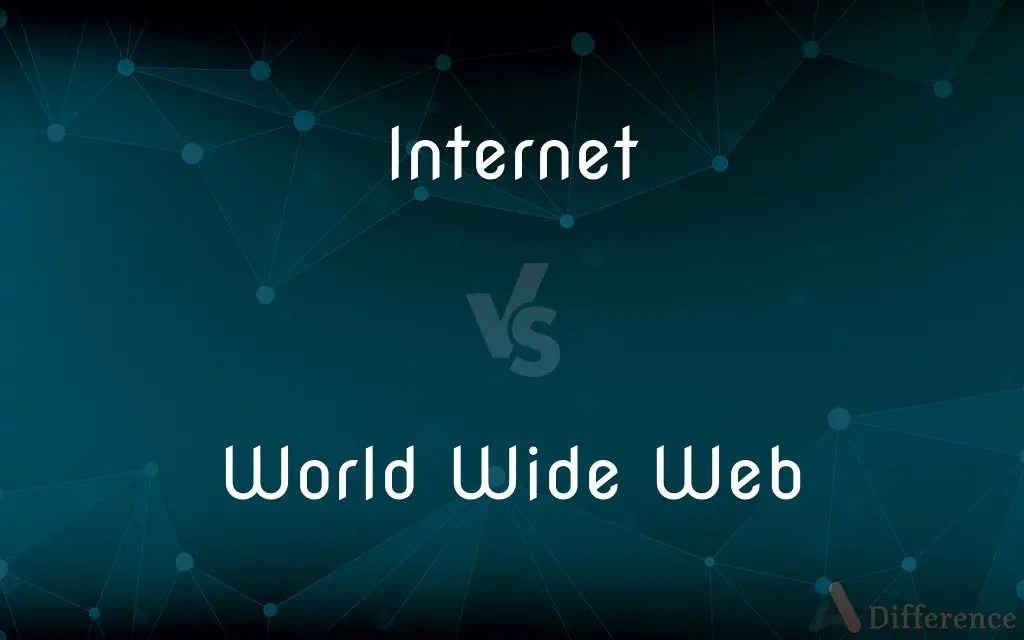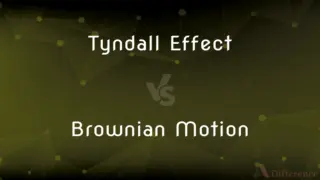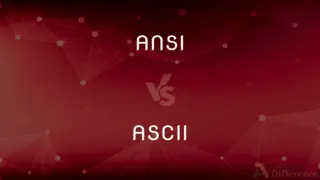Internet vs. World Wide Web — What's the Difference?
By Tayyaba Rehman — Published on December 2, 2023
The Internet is a global network of interconnected computers, while the World Wide Web is a system of interlinked documents accessed via the Internet.

Difference Between Internet and World Wide Web
Table of Contents
ADVERTISEMENT
Key Differences
The Internet is a massive network connecting millions of computers worldwide, allowing them to communicate. In contrast, the World Wide Web is a service that runs on the Internet, enabling the access and sharing of information through web pages.
While the Internet supports a variety of services like email, FTP, and VoIP, the World Wide Web specifically refers to the collection of publicly accessible websites and web pages using browsers. The Internet provides the infrastructure, and the World Wide Web is one of the services it hosts.
The Internet uses a range of protocols such as TCP/IP for data transmission, making it a foundational technology. On the other hand, the World Wide Web utilizes HTTP/HTTPS protocols, which are crucial for web browsing and information retrieval.
Development of the Internet began in the 1960s with ARPANET, laying the groundwork for global connectivity. The World Wide Web, however, was invented by Tim Berners-Lee in 1989, building upon the existing Internet to create a web of interconnected documents.
In terms of content, the Internet encompasses everything from email servers to connected devices (IoT). The World Wide Web, however, is specifically about web pages and sites, including multimedia content accessible via web browsers.
ADVERTISEMENT
Comparison Chart
Definition
Global network of interconnected computers.
System of interlinked documents on the Internet.
Services
Supports email, FTP, VoIP, and more.
Focuses on websites and web pages.
Protocols Used
Uses TCP/IP for data transmission.
Uses HTTP/HTTPS for accessing web content.
Invention Timeline
Began with ARPANET in the 1960s.
Invented by Tim Berners-Lee in 1989.
Content Scope
Encompasses a wide range of digital services.
Specifically about web pages and sites.
Compare with Definitions
Internet
A global system of interconnected computer networks.
The Internet has revolutionized global communication.
World Wide Web
A service on the Internet using HTTP protocol.
Browsing the World Wide Web has become a daily activity for many.
Internet
A platform enabling various digital services and communications.
The Internet has made remote work a feasible option for many.
World Wide Web
A system enabling the access of multimedia content online.
The World Wide Web hosts diverse content, from text to videos.
Internet
The infrastructure for global connectivity and data sharing.
The Internet connects billions of devices worldwide.
World Wide Web
A system of interlinked hypertext documents accessed via the Internet.
The World Wide Web is a vast repository of knowledge and information.
Internet
A network using TCP/IP protocol for data exchange.
Without the Internet, our daily digital interactions would be impossible.
World Wide Web
A collection of publicly accessible websites and web pages.
The World Wide Web has made information readily accessible.
Internet
A network supporting diverse applications from email to streaming.
The Internet has transformed entertainment and education.
World Wide Web
A platform facilitating information sharing through web browsers.
The World Wide Web has played a pivotal role in global education.
Internet
A publicly accessible system of networks that connects computers around the world via the TCP/IP protocol.
Internet
Alternative case form of Internet
Internet
(uncountable) Internet access or connection; internet connectivity.
Do you have internet at your place? My internet is down and I want to check my email.
Hello everyone, this is your daily dose of internet.
Internet
(countable)
Internet
Any set of computer networks that communicate using the Internet Protocol; an intranet.
Internet
A fictitious unit of scoring awarded for making outstanding posts on the internet.
Internet
To use the Internet; specifically, to search for information using the Internet.
Having no idea what that means, I am internetting like mad.
Internet
To entwine or link (several things) together, so as to form a network; to interconnect, to network.
Internet
To connect (a computer, an electronic device, etc.) into a computer network (in particular, the Internet).
Internet
A large network{3} of numerous computers connected through a number of major nodes of high-speed computers having high-speed communications channels between the major nodes, and numerous minor nodes allowing electronic communication among millions of computers around the world; - usually referred to as the internet. It is the basis for the World-Wide Web.
Internet
A computer network consisting of a worldwide network of computer networks that use the TCP/IP network protocols to facilitate data transmission and exchange
Common Curiosities
What is the Internet?
It's a global network of interconnected computers enabling various digital services.
Can you access the World Wide Web without the Internet?
No, the World Wide Web requires the Internet to function.
What protocols does the World Wide Web use?
The World Wide Web uses HTTP/HTTPS protocols for accessing web content.
How do the Internet and World Wide Web differ?
The Internet is the infrastructure, while the World Wide Web is a service that operates on it.
Who invented the World Wide Web?
Tim Berners-Lee invented the World Wide Web in 1989.
Is the World Wide Web the same as the internet?
No, the World Wide Web is a part of the Internet, not the same thing.
What does the World Wide Web refer to?
It refers to a system of interlinked documents and websites accessible via the Internet.
When was the Internet developed?
The development of the Internet began in the 1960s with projects like ARPANET.
What protocols does the Internet use?
The Internet primarily uses TCP/IP protocols for data transmission.
Does the Internet only consist of the World Wide Web?
No, the Internet includes a wide range of services beyond the World Wide Web.
How do the Internet and World Wide Web complement each other?
The Internet provides the infrastructure, while the World Wide Web utilizes it to share information.
Are all online activities considered part of the World Wide Web?
Not all; for example, FTP and VoIP operate on the Internet but are not part of the World Wide Web.
Can the Internet exist without the World Wide Web?
Yes, the Internet can exist without the World Wide Web, as it supports various other services.
How has the World Wide Web impacted information access?
It has dramatically increased the ease and speed of accessing information globally.
Is email part of the World Wide Web?
Email operates on the Internet but is not part of the World Wide Web.
Share Your Discovery

Previous Comparison
Tyndall Effect vs. Brownian Motion
Next Comparison
ANSI vs. ASCIIAuthor Spotlight
Written by
Tayyaba RehmanTayyaba Rehman is a distinguished writer, currently serving as a primary contributor to askdifference.com. As a researcher in semantics and etymology, Tayyaba's passion for the complexity of languages and their distinctions has found a perfect home on the platform. Tayyaba delves into the intricacies of language, distinguishing between commonly confused words and phrases, thereby providing clarity for readers worldwide.














































